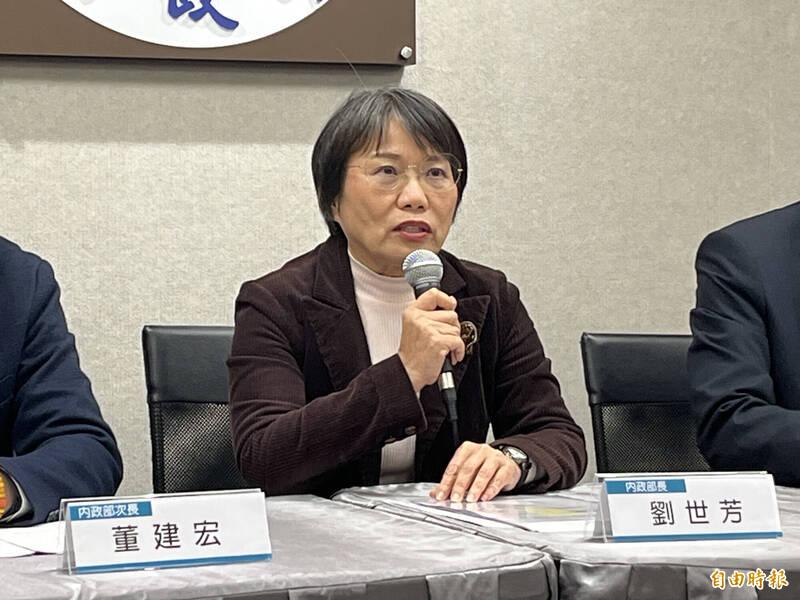More than 40 Taiwanese citizens are under investigation for allegedly holding Chinese identity cards, with 14 individuals having already been notified that their Taiwanese household registrations and other documents are to be revoked, Minister of the Interior Liu Shyh-fang (劉世芳) said yesterday.
Asked whether Huang An (黃安), a Taiwanese singer and long-term resident of China, was among those whose Taiwanese citizenship is being revoked, Liu today said this was personal information that is not supposed to be disclosed.
Mainland Affairs Council Minister Chiu Chui-cheng (邱垂正) said if Huang holds a Chinese ID, his Taiwanese citizenship would be revoked immediately.

Photo: Li Wen-hsin, Taipei Times
At a news conference yesterday following a Ministry of the Interior meeting in Taipei, Liu said that Taiwanese citizens found illegally holding Chinese identity documents would have their Taiwanese health insurance, identity cards and passports revoked.
They would "not be Taiwanese citizens" anymore, she said.
Deputy Minister of the Interior Wu Tang-an (吳堂安) said that regulations governing household registrations mean that any Taiwanese found holding Chinese household registration would have their Taiwanese household registration canceled.
It "would not be very easy" for them to regain household registration in Taiwan in the future, Wu added, citing regulations.
At the news conference yesterday, Liu was also asked about a Taiwan-based Chinese social media influencer, known as "Yaya in Taiwan" (亞亞在台灣), who has been ordered to leave the country over her public statements advocating China's "military unification" of Taiwan.
Liu said that the NIA has followed the law and not deviated from procedural norms.
Liu also said that while online statements made by Yaya have been "inconsistent," the penalty against her remains unchanged.
If the Chinese national — whose residence permit was based on her marriage to a Taiwanese citizen — does not comply with her 10-day deportation order, then she would be forcibly removed from the country, the minister said.
Asked about how many Chinese social media influencers whose residence permits were based on marriage to a Taiwanese citizen have been questioned or investigated due to public statements advocating China's "military unification" of Taiwan, Liu said the number of cases varies as they continue to receive more reports every day.
The authorities receive reports from different channels, she said, adding that the council and the National Immigration Agency would investigate anyone who was reported whether they were Taiwanese allegedly holding Chinese IDs or Chinese spouses.
Asked whether Huang would face any punishment for his comments about surrendering after a Chinese invasion given that Chinese spouses making public comments that promote China’s “military unification” could be deported, Chiu today said that the council would take action.
Describing Huang’s comments as arousing public anger, Chiu said the council is to investigate whether Huang has applied for a Chinese ID and cooperated with the Chinese government, the Chinese military and the Chinese Communist Party.
The agency's recent actions had prompted Pa Chiung (八炯), a popular YouTuber who is critical of the Chinese Communist Party, to call for a public protest against the National Immigration Agency over this and similar cases.
Pa Chiung had brought up the issue of Taiwanese citizens illegally holding Chinese identity documents into the public spotlight in recent weeks through videos posted on social media.

The manufacture of the remaining 28 M1A2T Abrams tanks Taiwan purchased from the US has recently been completed, and they are expected to be delivered within the next one to two months, a source said yesterday. The Ministry of National Defense is arranging cargo ships to transport the tanks to Taiwan as soon as possible, said the source, who is familiar with the matter. The estimated arrival time ranges from late this month to early next month, the source said. The 28 Abrams tanks make up the third and final batch of a total of 108 tanks, valued at about NT$40.5 billion

Two Taiwanese prosecutors were questioned by Chinese security personnel at their hotel during a trip to China’s Henan Province this month, the Mainland Affairs Council (MAC) said yesterday. The officers had personal information on the prosecutors, including “when they were assigned to their posts, their work locations and job titles,” MAC Deputy Minister and spokesman Liang Wen-chieh (梁文傑) said. On top of asking about their agencies and positions, the officers also questioned the prosecutors about the Cross-Strait Joint Crime-Fighting and Judicial Mutual Assistance Agreement, a pact that serves as the framework for Taiwan-China cooperation on combating crime and providing judicial assistance, Liang

A group from the Taiwanese Designers in Australia association yesterday represented Taiwan at the Midsumma Pride March in Melbourne. The march, held in the St. Kilda suburb, is the city’s largest LGBTQIA+ parade and the flagship event of the annual Midsumma Festival. It attracted more than 45,000 spectators who supported the 400 groups and 10,000 marchers that participated this year, the association said. Taiwanese Designers said they organized a team to march for Taiwan this year, joining politicians, government agencies, professionals and community organizations in showing support for LGBTQIA+ people and diverse communities. As the first country in Asia to legalize same-sex

MOTIVES QUESTIONED The PLA considers Xi’s policies toward Taiwan to be driven by personal considerations rather than military assessment, the Epoch Times reports Chinese President Xi Jinping’s (習近平) latest purge of the Chinese People’s Liberation Army (PLA) leadership might have been prompted by the military’s opposition to plans of invading Taiwan, the Epoch Times said. The Chinese military opposes waging war against Taiwan by a large consensus, putting it at odds with Xi’s vision, the Falun Gong-affiliated daily said in a report on Thursday, citing anonymous sources with insight into the PLA’s inner workings. The opposition is not the opinion of a few generals, but a widely shared view among the PLA cadre, the Epoch Times cited them as saying. “Chinese forces know full well that